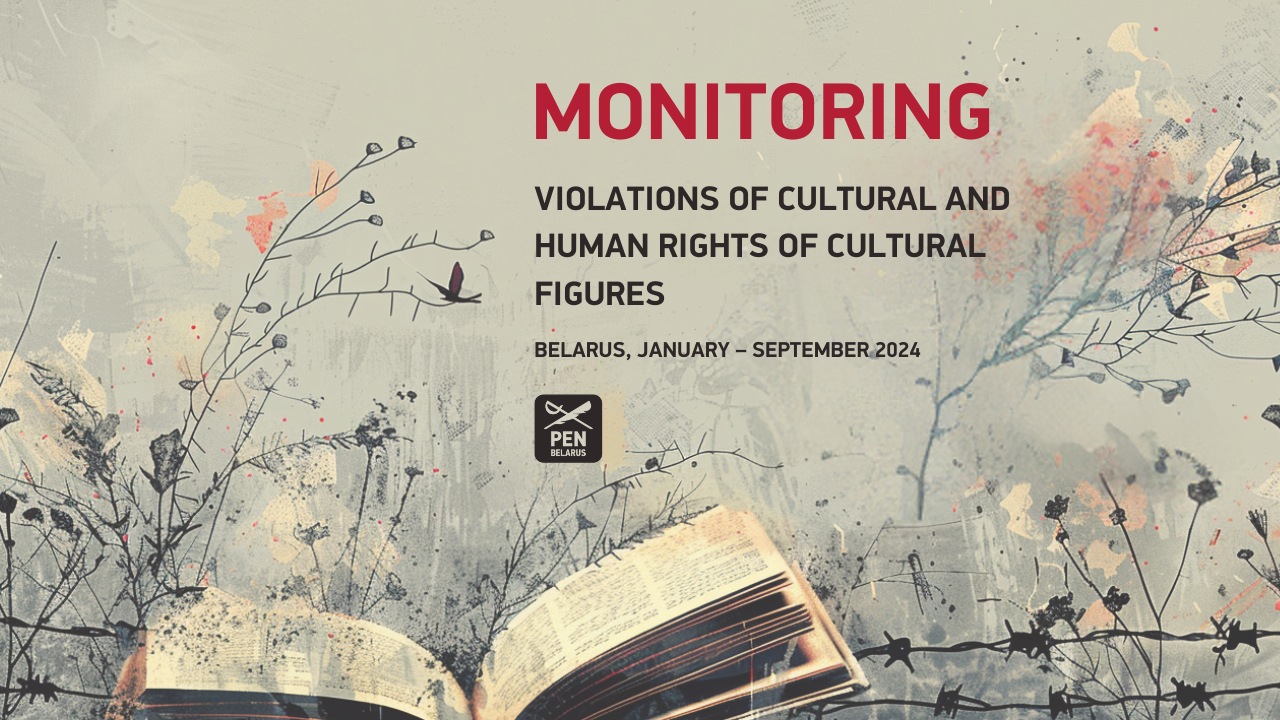
The report is based on the information collected by the PEN Belarus monitors from open sources (89% of facts), through personal contacts, and in direct communication with cultural figures on the condition of confidentiality (11%) from January – September 2024. Unfortunately, information about violations is increasingly leaving the public domain. If you can report violations (confidentially) or correct inaccuracies, please contact us at [email protected], t.me/viadoma. The more accurately we can record and analyse the human rights situation in the cultural sphere, the more effectively we can plan our work to support cultural actors and projects. For more information about the monitoring’s methodology, check here.
NB: for users’ information security, we do not provide direct links to sources of information if they are subject to restrictions under the regulations in force in the Republic of Belarus.
Main results
Cultural figures behind bars: incommunicado and deteriorating health
Arbitrary detentions and arrests, administrative and criminal prosecution
The gender dimension of violations
Violations of cultural rights
• censorship
• cultural heritage and the culture of memory
Conclusion
MAIN RESULTS
⇒ Between January and September 2024, PEN Belarus monitors recorded 960 violations of cultural rights and human rights of cultural figures.
Violation of the right to a fair trial and access to justice tops the list, with criminal prosecution and arbitrary detention (or arrest) ranked second and third among all violations against cultural figures.
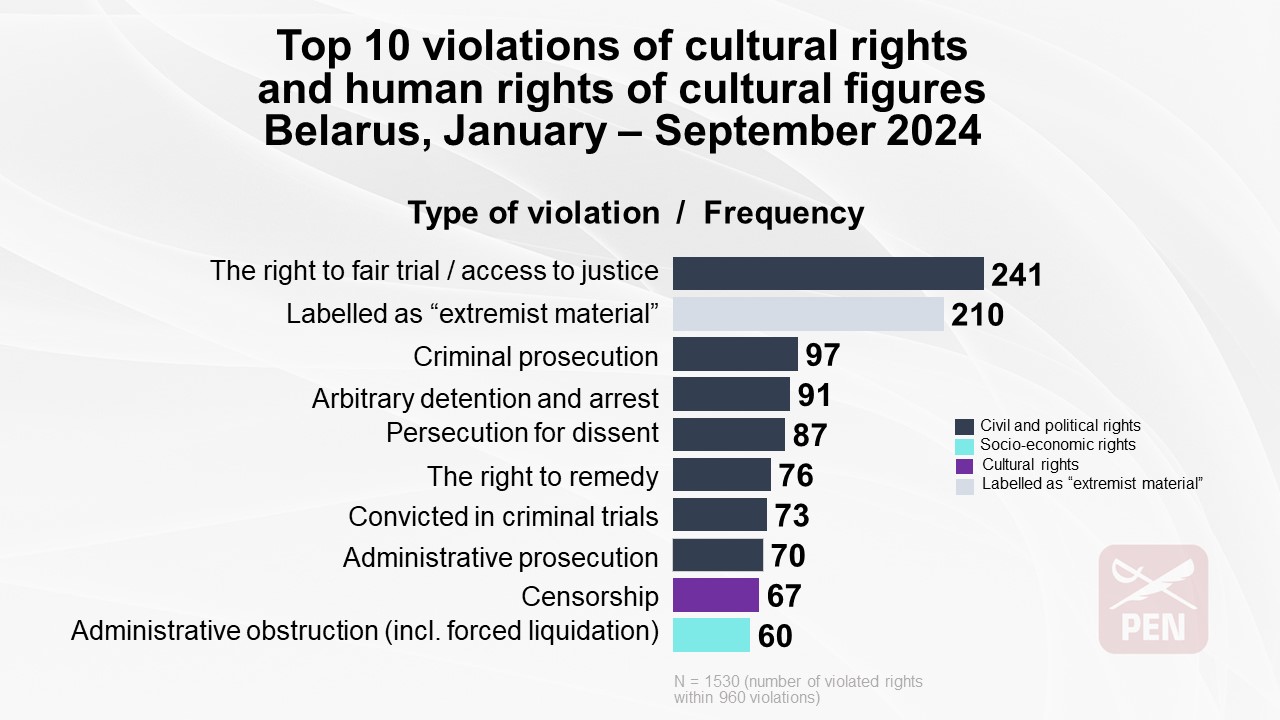
⇒ As of the end of September 2024, there were 1317 political prisoners in Belarus [1], including at least 101 cultural figures. No less than 164 cultural figures, including 37 imprisoned writers, are incarcerated or serving home confinement sentences.
During the nine months of 2024, at least 41 cultural figures were recognised as political prisoners (6 persons – ex post facto [2]). At least 34 people were released during this period: 26 artists were released after fully serving their sentences (between one and four years), 7 were pardoned [3], and one person (a Ukrainian citizen) was exchanged as a prisoner [4]. After their release, several cultural figures were subjected to preventive supervision and “monitoring of their behaviour” by law enforcement officials. This supervision prevents former convicts from returning to normal life fully and without restrictions.
⇒ Political prisoners Maryja Kalesnikava, Maksim Znak, Viktar Babaryka and Siarhiej Cichanoŭski have remained incommunicado behind bars for more than 18 months.
⇒ Arbitrary detentions and arrests affected at least 91 cultural figures.
⇒ Criminal cases were opened against at least 97 cultural figures (including 43 political emigrants). At least one in six cultural figures has faced repeated politically motivated criminal prosecution since the events of 2020.
⇒ At least 73 criminal sentences were handed down against 72 cultural figures (12 in absentia).
Participation in the 2020 peaceful protests (every second case) and alleged involvement in “extremist activities” (every third case) accounted for most charges in politically motivated sentences against cultural figures.
Authorities started to treat support for political prisoners as facilitation of extremism – the Belarusian judicial system began to hand down prison sentences for money transfers and food parcels to political prisoners. Criminal prosecution for donations to solidarity funds and paramilitary organisations, for cooperation (in particular, interviews) with independent media continues. Due to the closed nature of the trials, the exact charges remain unknown for a significant number of convictions associated with facilitation or participation in allegedly “extremist activities”.
Regarding sentences in absentia, the most frequent charges against cultural figures in exile were based on the Criminal Code provisions dealing with “extremist activities”, followed by the articles on defamation (insulting representatives of the authorities) and incitement to hatred.
It is also worth noting that this is the first known case of a sentence (in absentia) based on the charges contained in Article 193-1 dealing with illegal activities of a public association. The article was re-introduced into the Criminal Code in January 2022, six months into the campaign to liquidate civil society organisations forcibly.
⇒ The toughening of the punishment has been one of the trends in 2024, namely, replacing home confinement with incarceration in a penal colony. The number of trials on such cases is growing, including against those who fled Belarus after the sentence. Thus, on 11 September, a court hearing was held to replace the type of punishment for the singer Meryjem Hierasimienka.
⇒ No less than 43 cultural figures were added to the “List of citizens involved in extremist activities” during the analysed period, including those convicted in absentia. Three cultural activists were added to the “List of persons involved in terrorist activities” (musician Uładzisłaŭ Navažyłaŭ; writer, poet and public figure Aleh Kacapaŭ; blogger, activist and songwriter Andrej Pavuk). As of writing, the list contains three dozen cultural figures.
⇒ At least 61 cultural figures were subjected to administrative prosecution.
By and large, if one compares the statistics of violations recorded from January to September 2024 with the same period last year, one can state that the criminal prosecution of cultural figures inside Belarus remains at the same level. The number of cases of special proceedings and sentences in absentia is rising. The number of arbitrary detentions and administrative prosecutions is considerably less. However, time will show whether the number has dropped or less information on such cases has become available.
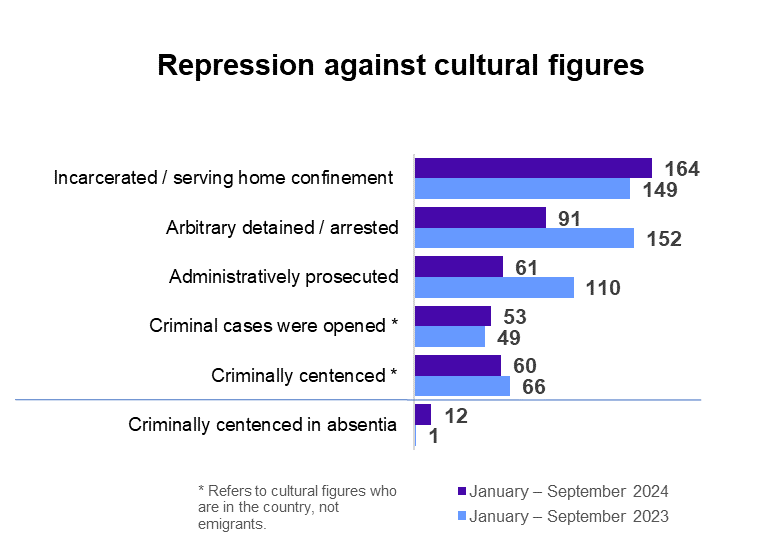
⇒ The monitors recorded cases when 35 cultural figures were dismissed for political reasons: after failing to pass “reliability” checks by security services, after politically motivated administrative persecution, for “failure to fulfil plans”, following denunciations, after getting on the “lists” and during the subsequent waves of “purges”, after an “incident” (a “wrong” song at a concert).
At least 4 theatre directors were dismissed during nine months of this year: Tacciana Čajeŭskaja, who headed the Minsk Regional Puppet Theatre “Batlejka”, Siarhiej Pukita from the Belarusian State Academic Musical Theatre, Dzmitry Harelik from the Homiel State Puppet Theatre, Sviatłana Karukina from the Theatre of Belarusian Dramaturgy.
⇒ 67 cases of cultural censorship against cultural figures, groups or events were recorded.
In some cases, works or authors were not allowed to be shown or participate in concerts, exhibitions, or conferences; in other cases, adjustments were made in line with the demands of state ideologues. Initially approved events would sometimes be cancelled, mainly after denunciations by pro-Lukashenka or pro-Russia activists. Cancellations were recorded in Minsk, Hrodna, Połack, Homiel, Viciebsk, Brest and other cities.
⇒ Persecution for communicating in Belarusian continues, while insulting statements by pro-government propagandists against the national language remain unpunished. Growing is the number of Belarusian books – especially on historical topics – formally forbidden to buy and read. Some of those books were physically destroyed.
⇒ There were 41 violations related to improper handling of historical and cultural heritage objects and culture of memory.
The sculptural composition on the grave of the artist Alena Kiš is in an emergency condition. Kiš is one of the brightest representatives of Belarusian primitive art, whose works are kept in the Museum of Belarusian Paintings in Zasłaŭl.
Acts of vandalism continue at the burial sites of Stalinist repression’s victims – the Kurapaty memorial complex, included in the State List of Historical and Cultural Heritage of the Republic of Belarus, and the memorial near the village of Chajsy (also known as “Viciebsk Kurapaty”). Unknown perpetrators continue to break crosses and commit other acts of vandalism at those sites.
⇒ Attacks on the Belarusian cultural sites in Vilnius were recorded. Perpetrators damaged the windows and left an insulting inscription on the facade of the shop of Belarusian souvenirs, “Kropka”. The Centre of Belarusian Culture and Community windows in Vilnius were broken. The police have yet to identify those behind the attacks, but there are enough reasons to consider these incidents not accidental phenomena.
⇒ 31 culture-related non-profit organisations were forcibly liquidated. At least five of them were public associations promoting ethnic minority cultures in Belarus – Georgian, Turkmen, Tatar and Jewish.
⇒ At least 210 information resources publishing culture-related materials or social networks of cultural figures were designated as “extremist materials“.
Among those listed in Q3 2024 are the YouTube channel (as well as Facebook and VKontakte pages) About Culture run by Mikita Monič, a former National Art Museum guide who describes his project as “a Belarusian channel about how to enjoy cultural products, about how and why to go to museums and theatres;” YouTube channel run by former Bolshoi Theatre of Belarus soloist Marharyta Laŭčuk Margarita Levchuk. Soprano; YouTube channel of the Daj Darohu! Punk rock band; Instagram pages of graphic designer (Uładzimir Cesler) Vladimir Tsesler and artist Anton Radzivonaŭ (Rodionov); the film “Belarusian Post-Waw Resistance Movement 1944-1957”; the page “Singing Assembly” in VKontakte; a video clip for Alaksandr Bal’s poem There is Trouble in My Homeland; a community of Belarusian-language Wikipedia fans; the websites of the Reformation project (Cultural Front section); the punk art project Photonegativki in Telegram and Instagram; three books by historian Ihar Melnikaŭ, and other materials.

⇒ The government continues brainwashing employees of cultural and educational institutions to make them loyal to the state course and “correct” patriotism. In the third quarter, several events were held to mark the 30th anniversary of the presidency, which is how many years the same person has ruled the country. This date, solemn in the eyes of propaganda, is, in fact, a symbol of authoritarian stagnation, suppression of dissent and creative unfreedom in Belarus.
CULTURAL FIGURES BEHIND BARS:
INCOMMUNICADO AND DETERIORATING HEALTH
As of late September 2024, at least 108 cultural figures were behind bars. The monitors recorded violations of the imprisonment conditions for 31 people. The facts that have come to light are only a tiny part of the violations that all incarcerated cultural figures face daily.
Political prisoners – musician, cultural manager and public figure Maryja Kalesnikava; political figure and philanthropist Viktar Babaryka; lawyer, writer and bard Maksim Znak; political figure and cultural manager Siarhiej Cichanoŭski – have been held incommunicado for more than 18 months. They are all subjected to total isolation – no contact with family, friends, or lawyers. Other prisoners are forbidden from communicating with them under threat of punishment.
Incarceration in prisons and penal colonies causes significant damage to the health of most people, in extreme cases leading to hospitalisation and even death [5]. The monitors learned from the former prisoners that Maryja Kalesnikava lacked proper nutrition in the penal colony. Being 175 cm-high, she weighed only 45 kilograms. During the reporting period, it became known about the aggravating health problems of the writer and translator Alaksandr Fiaduta, writer and human rights activist Aleś Bialacki, journalist, poet, musician Andrej Pačobut (Andrzej Poczobut), and Viktar Babaryka. Ihar Alinievič, a writer and anarchist movement activist, was hospitalised in June this year with a suspected stomach ulcer. Local historian and activist Uładzimir Hundar (who has a Grade 2 disability) has serious health problems and publicist and activist Alena Hnauk (she was supposed to have an operation in January, but any other details are not available). It is known that artist Hienadź Drazdoŭ has already suffered two strokes while in prison.
Despite serious health problems, prisoners are regularly sent to hard labour, placed in punitive isolation cells and transferred to cell-type rooms. According to former prisoners, medical care is either not provided at all or offered untimely and inappropriately.
Cruel treatment is widespread in administrative arrests. We know the story of a musician who, in the spring of this year, spent three days awaiting trial in a piercingly cold cell without a pillow or mattress at night in unsanitary conditions. He was detained for an old photo with a white-red-white flag in the background. He came out sick, underwent lengthy treatment and continues to take painkillers to walk, as his leg failed after imprisonment. In another example, punk rock musician Viktar “Mao” Žarkievič died at home on 22 September this year due to heart failure, according to acquaintances. The musician’s health was severely undermined because of his brutal detention in September 2022 and 13 days spent in the notorious remand prison in Akrescina Street in Minsk.
The May 2024 Report by the Special Rapporteur on the human rights situation in Belarus, Anaïs Marin, noted numerous instances of ruthless treatment of prisoners deprived of their liberty for political reasons.
ARBITRARY DETENTIONS AND ARRESTS, ADMINISTRATIVE AND CRIMINAL PROSECUTION
During the analysed period, 91 cultural figures were arbitrarily detained or arrested. As of writing, there is no information on the outcome of at least 20 detentions (22% of cases).
The courts considered at least 70 administrative cases against 61 cultural figures. Known are the articles mentioned in court rulings of 52 trials: 40 cases (77% of the offence reports) were based on “distribution of extremist materials” (Article 19. 11 of the Code of Administrative Offences (CAO), 10 (19%) – on alleged “picketing” with a white-red-white flag and (or) the Pahonia (Pursuit) symbol in social media (Article 24.23 of the CAO), in two more cases (4%) – on “petty hooliganism” (Article 19.1 of the CAO). The rulings are known in 50 administrative cases: in 31 cases (62% of offence reports), people were sentenced to between 5 to 15 days of arrest, in 19 cases (38%) – to fines amounting to between 400 to 5400 rubles ($120-1630).
Criminal proceedings were initiated against at least 54 cultural figures inside Belarus and 43 political emigrants, including 18 of them subjected to ‘special proceedings’ (trials in absentia). All in all, at least 97 cultural figures faced criminal prosecution during this period. At least for one in six of them, it was not the first politically motivated criminal prosecution after the events of 2020. New cases were opened against the incarcerated convicts – publicist and activist Dzmitry Daškievič, cultural manager and businessman Eduard Babaryka, artist and cartoonist Ivan Viarbicki, authors of prison literature and anarchist movement activists Alaksandr Franckievič and Mikałaj Dziadok; against the previously repressed and released: writer and cultural manager Siarhiej Makarevič – on bail, Belarusian language teacher Ema Sciepulonak – after serving her full term; against previously convicted political emigrants – architect and activist Vadzim Dzmitronak and musician Uładzisłaŭ Navažylaŭ.
At least 60 cultural figures (61 criminal convictions) were prosecuted inside Belarus, and 12 sentences in absentia were handed down against cultural figures in exile.
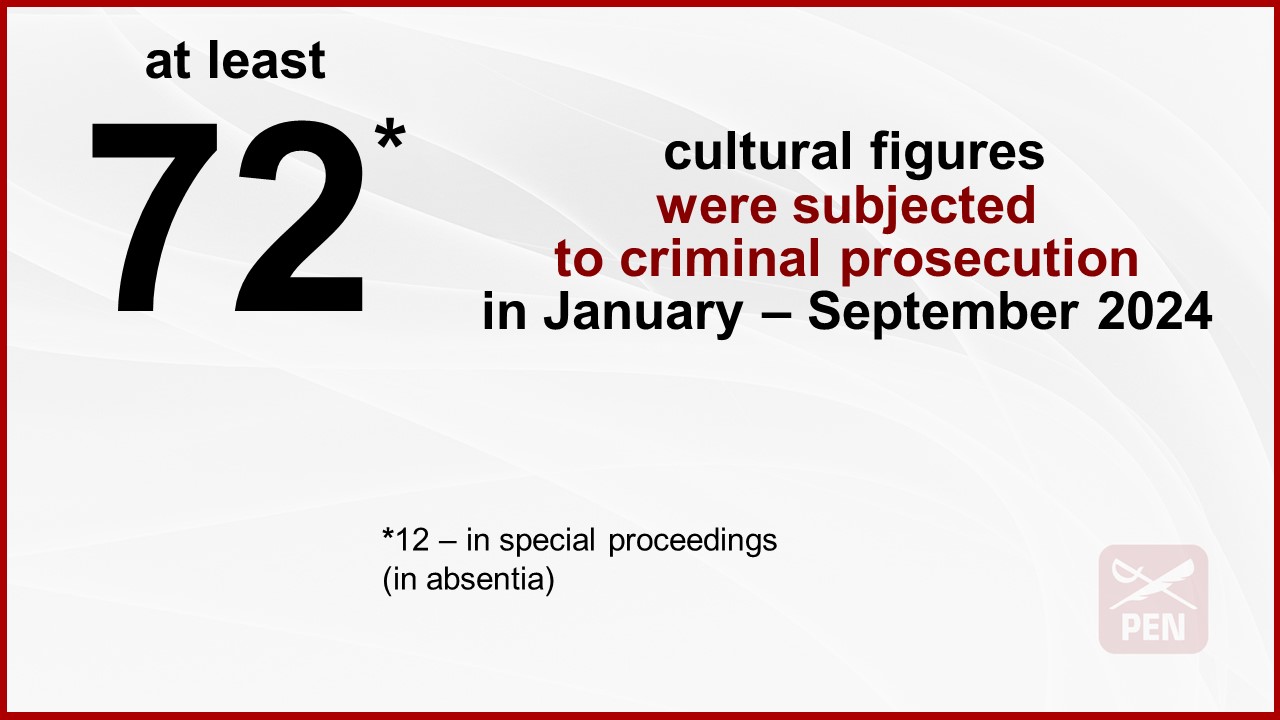
Regarding the trials with the accused present in court, participation in the peaceful protests of 2020 was, as before, the most frequent reason for criminal prosecution. Article 342 of the Criminal Code (Organising, preparing or participating actively in actions that grossly violate public order) was applied to charge at least one in two cultural figures convicted during the analysed period.
Participating in or facilitating extremist activities (Articles 361-1, 361-2, 361-3, 361-4 of the Criminal Code) was the second most frequent reason. Every third cultural figure was convicted under one or more articles of the Criminal Code. A specific feature of 2024 is that courts treat support for political prisoners (letters, parcels, money transfers) as facilitating extremist activity. Thus, in Q3 2024, artisan Natalla Charytonava-Kryževič was convicted for solidarity and sentenced to five years in home confinement. Former bibliographer of the National Library Ksienija Suša received three years in a penal colony. Bibliographer Iryna Pahadajeva was sentenced to three years in a penal colony.
Prosecution for donations continues. Illustrator Natalla Levaja was detained on her return from Poland and sentenced to six years in a penal colony and a 40,000 BYN (~$12,080) fine over the donations to solidarity campaigns and the Kastuś Kalinoŭski Regiment military unit in 2021-2022 [6]. It is known that Natalla voluntarily paid the state the “compensation” for donations she had made in 2020 to the funds of solidarity with the victims of violence and repression. She had a written confirmation from the KGB about the paid “compensation.”
As for the sentences in absentia, the most frequent charges against cultural figures in exile were based on the articles in the Criminal Code dealing with “extremist activity.” Insulting representatives of the authorities (Articles 367-369 of the Criminal Code) and incitement to hatred (Article 130) were the second most frequent.
It is also worth noting that the first known case, when the sentence in absentia was based, among others, on the article dealing with the illegal activity of a public association, was returned to the Criminal Code in January 2022. Thus, on 2 August, writer and psychologist Volha Vialička was tried in special proceedings (in absentia) and found guilty under seven criminal articles, including 193-1 (Illegally organising the activities of a public association, religious organisation or foundation or participating in their activities) and sentenced to nine years in prison and a 12,000 BYN (~$3,600) fine. When she lived in Belarus, Volha headed the Hrodna Children’s Hospice, which was forcibly liquidated by the authorities in August 2021.
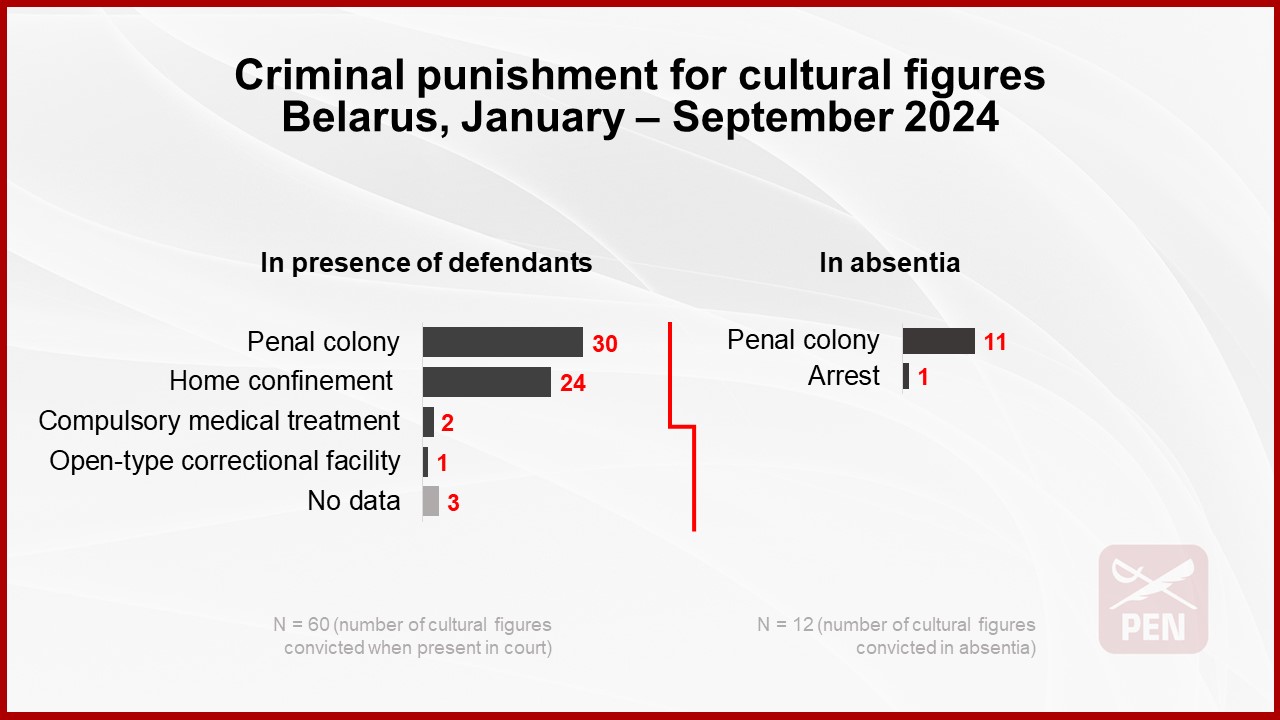
THE GENDER DIMENSION OF VIOLATIONS
According to the Human Rights Centre “Viasna”, by the end of September 2024, there were 169 female and 1,148 male political prisoners in Belarus. Of these, 13% of women and 7% of men are cultural figures – 22 and 79 people, respectively.
Because of politically motivated persecution, at least 22 female cultural figures (20% of the total number of cultural figures behind bars) are in penal colonies, prisons, remand centres, in home confinement and forced treatment facilities. At least 30 female cultural figures (54% of the total number of cultural figures in home confinement) are in home confinement. At least 52 female cultural figures (32% of the total number of cultural figures deprived of liberty or restricted in it) are in places of incarceration and home confinement.
Among those imprisoned or serving their sentences in home confinement are at least 11 female writers: linguist Anastasija Maciaš (sentenced to 2 years in a penal colony); literary scholar and translator Darja Chmialnickaja (5.5 years in a penal colony); local historian and documentary filmmaker Łarysa Ščyrakova (3.5 years in a penal colony); sociologist and publicist Tacciana Vadałažskaja (2.5 years in a penal colony), political scientist, publicist Valeryja Kasciuhova (10 years in a penal colony), writer and journalist Kaciaryna Andrejeva (Bachvałava) (8 years and 3 months in a penal colony). Writer, poet, translator and doctoral student Alena Cieraškova, poet and cultural manager Aksana Jučkavič, philologist Natalla Sivickaja, philologist and writer Nadzieja Staravojtava, writer and journalist Jana Cehła are in home confinement for 2-3 years.
During July – September 2024, at least 115 people, convicted on political grounds, were released from prison after receiving a pardon. The number included six cultural figures, five of whom were women: documentary filmmaker and journalist Ksienija Łuckina, dancer and entrepreneur Viktoryja Haŭrylina, historical archive employee Natalla Piatrovič, urbanist and geographer Hanna Skryhan, and Russian language and literature teacher Ała Zujeva.
Overall, one in three cases of repression or censorship recorded by the monitors in the nine months of 2024 occurred against female cultural figures. The rights of at least 116 women from the cultural sector were affected.
Violation of the right to a fair trial and access to justice is the most frequent type of violation against female cultural figures, followed by persecution for dissent (dismissals, searches, interrogations, forced compensation for donations and other forms of harassment). During the analysed period, 35 politically motivated dismissals from the cultural sphere were recorded; in every second case (17 people), they affected female employees from various cultural sectors: museums, theatre, music, cinema, and educational institutions. Criminal prosecution is in third place.
Administrative prosecution (recorded cases) occurred against 20 female cultural figures. Based on the known court rulings, fines were awarded in two in three cases.
During the first nine months of this year, at least 23 female cultural figures (38% of the total number of convicted cultural figures) were convicted. 10 of them were sentenced to between one and six years in a penal colony, 12 – to home confinement between 2.5 and 5 years. One woman was sentenced to forced compulsory medical treatment.
Those convicted during this period for helping political prisoners and those who became prisoners were all women: craftswoman Natalla Charytonava-Kryżevič, bibliographers Ksienija Suša and Iryna Pahadajeva.
Natalla and Ksienija were detained during the January raid of security services on people who helped political prisoners and their families with food parcels in the framework of the INeedHelpBY social initiative (on 23 January, the KGB added it to the list of “extremist formations”). Ksienija Suša was charged under Articles 361 of the Criminal Code (Calls for actions aimed at harming the national security of the Republic of Belarus) and 361-4 (Facilitating extremist activities) and sentenced to three years in a penal colony. Natalla Charytonava-Kryževič was charged under two parts of Article 361-4 and sentenced to five years in home confinement. Other details of these two cases remain unknown to human rights activists.
Bibliographer Iryna Pahadajeva was detained in May for helping political prisoners. A court sentenced her to three years in a penal colony for 32 money transfers totalling 188 rubles (~$57) to a remand prison.
The conditions of incarceration created by the penitentiary system of Belarus for women prosecuted for political reasons is a separate significant and vital topic, researched based on the testimonies of people leaving places of imprisonment. It will require further studies in the future. Every woman behind bars undergoes many psychological and physical trials. She is often released from prison with a loss of health – exacerbation of chronic diseases, deterioration of hair, skin, teeth, weakened immunity, and reproductive problems. Due to stress, cold, malnutrition, carrying heavy loads, physical exhaustion and other harsh conditions, women often experience menstrual irregularities. The lack of hygiene products and medical supervision in prison frequently leads to infections and long-term reproductive problems, including infertility. Dozens of female cultural figures remain behind bars for months or years.
The health condition and threat to the life of Maryja Kalesnikava, who is serving her sentence in the women’s colony No. 4 in Homiel, remain of great concern. The political prisoner has been under tremendous pressure while behind bars since the beginning of September 2020 – for four years already. For the last 18 months, there has been no communication with Maryja and information about her has been collected in bits and pieces from women leaving the Homiel colony. As of writing, it is known that Maryja Kalesnikava – musician, cultural manager and one of the leaders of the 2020 peaceful protest – has severe health problems, weighs 45kg, being 175cm tall.
VIOLATIONS OF CULTURAL RIGHTS
CENSORSHIP
- Cancellation of events and ban on performances
During the analysed period, the monitors recorded 67 cases of censorship against cultural figures and cultural or entertainment events, including cancellation or suspension of approved exhibitions, performances, film screenings or concerts by individual performers or groups, removal of works or thematic blocks from an exhibition, refusals to grant a touring certificate, bans on festivals and conferences, exclusion from the congress programme, and others.
The main reasons for censorship are persecution for the events of 2020 and the “ban lists” of cultural figures. In the analysed period, the monitors recorded 15 people who were censored (often tacitly) for this reason. At the same time, it remains unknown how many cultural figures are crossed off from the list of potential authors and participants of events every time the KGB and the Ministry of Culture run them through “loyalty checks”. At the level of statistics, we know the case when the list of about twenty-five names was sent for approval, but less than ten people were allowed to participate in a theatre production.
Officials also censor the following topics: “propaganda of wrong values” – in particular, LGBT-related themes, sexuality, Western culture, and works of Ukrainian and Polish cultures. Among the recently cancelled events was the Kampai cosplay festival in Połack. it was cancelled because, according to the House of Culture’s new director, anime promotes “wrong values”. The Manhattan Short annual international short film festival programme was cut in the Belarusian distribution. Between 26 September and 6 October, nine out of ten participating films were screened because censors did not allow the Ukrainian film Mama to be shown about the beginning of the war in Ukraine.
Remarkably, several initially approved events were cancelled after denunciations by pro-governmental activists, the most infamous being Volha Bondarava (Olga Bondareva) from Hrodna. Her appeals to the Ministry of Culture and other executive bodies with demands to cancel or pay attention to a particular cultural figure are often connected, among other things, with the abovementioned topics. Thus, in Q3 2024 alone, Bondarava succeeded in cancelling the exhibition LITARA Ja by artist Antanina Falej in the salon-shop Galiareja Mastactva (Arts Galery), the 7th ethno-festival Karani (Roots) (16-18 August), concerts of Russian bands Psycheya (on 21 September in the Minsk club “Reactor”) and Melnitsa (on 7 December in the Minsk Prime Hall). After Bondarava’s post, the page dedicated to the life and works of dissident writer Łarysa Hieniuš was removed from the website of the Central Scientific Library.
- Pre-event interviews with performers, “explanatory conversations”
Pre-event interviews are one of the tools employed by the Ministry of Culture. In one example, Volha Bondarava appealed to the Minsk City Executive Committee’s culture department, demanding urgent measures to cancel Russian musicians’ AVG & Jakone concert in Minsk. Nevertheless, the gig took place on 13 September. Before the event, the Department of Culture checked the performers’ programme and found no violations. Still, the artists “were interviewed and advised that using profanity when performing songs and communicating with people from the stage was inadmissible”.
In another example, the Ministry of Culture received a complaint from a tourist claiming that a Brest Fortress tour guide “did not use the words BSSR or Byelorussia at all – only the word Belarus“. The Ministry of Culture responded to the complaining visitor that the following measures were taken: an explanatory conversation with the guide and “unscheduled listening to his excursion text at a control meeting”.
- Restrictions on books
During the analysed period, the monitors recorded new facts of violations related to the restriction of access to books, among which Belarusian historical literature, including the use of force against readers and physical destruction of books. We are aware of the cases – unreported in the public domain – when cultural figures were beaten over books in the Belarusian language, mainly historical literature, found in their possession during searches. We know from public sources about the cases when “wrong literature” was destroyed, that is, burned in the ovens at penal colonies.
The following three books by historian Ihar Melnikaŭ were labelled as “extremist”: Odyssey of a Palessie Man. Minsk: Alpha-book, 2017; Mielnikaŭ, I. B. The Forgotten Corps: The History of the Polish Army on the Territory of Babrujsk Region in 1918, 1919–1920. Minsk: Alpha-book, 2018; Mielnikaŭ, I. B. On the “Border of Civilisations”. Pages of history of the Pre-War Soviet-Polish Border in Belarus Minsk: Alfa-kniga, 2020.
Since 2022, several dozens of books on historical topics – works by Viktar Lachor, Kanstancin Zaleski, Anatol Taras, Sviatłana Kazłova, Uładzimir Arłoŭ, Otto Skorzeny, Uładzimir Biašanaŭ, Vadzim Dzieružynski, Siarhiej Zacharevič, Leanid Łyč, Viktor Suvorov, Oleg Usachev, Alaksandr Smalančuk, Sergei Suzev, Alexander Tatarenko, John Toland, Alexander Bushkov and other authors.
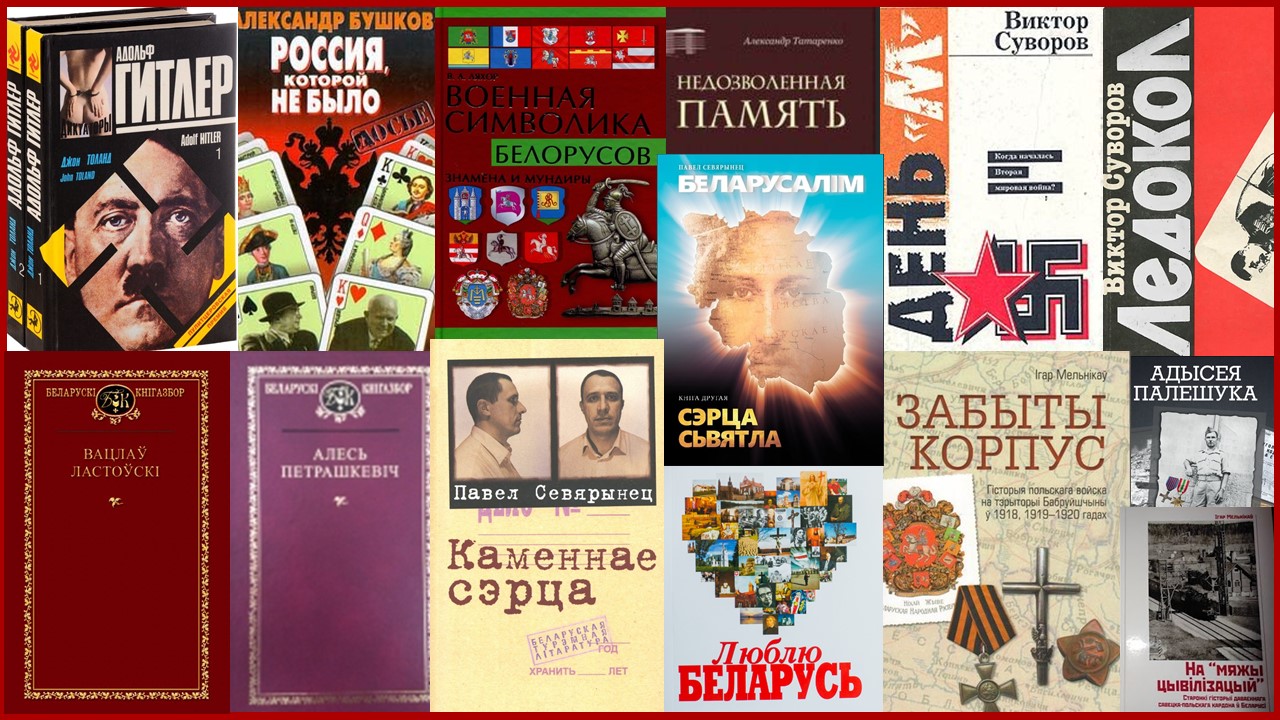
According to the Human Rights Centre “Viasna” quoting those who came out of prison, all books in the Belarusian language were removed from the library of Penal Colony No. 1 in Navapołack. Inmates are banned from borrowing the works of Sviatłana Aleksijevič, a Nobel Prize winner in literature, persecuted by the Belarus authorities, and classics of Belarusian literature Janka Kupała, Jakub Kołas, Uładzimir Karatkievič as well as the books in other languages – Polish, English, Lithuanian, etc. According to an interview on Radio Svaboda, in the spring of this year, the works by contemporary Belarusian authors, as well as the books on history, primarily those published in the early 1990s, disappeared from the prison library at Penal Colony No. 15 in Mahiloŭ. It is known that those books and George Orwell’s books were burnt in the boiler room ovens.
CULTURAL HERITAGE AND THE CULTURE OF MEMORY
There were 41 violations related to preserving historical and cultural heritage (with or without the status of historical and cultural value) and the culture of memory.
Authorities continue destructing mosaics and panels – patterns of decorative art of the Soviet period. There are fewer such urban history assets every year.
Question marks remain when it comes to restoring historical and cultural heritage monuments, particularly the quality of painting. Some examples: In August, the Telegram channel Spadčyna (Heritage) wrote about the ongoing repainting of the architectural ensemble of Belarusian National Technical University on Independence Avenue in Minsk in a shade of green, which could not have been on the facades of buildings in the 1950s. In September, the authors of the channel drew attention to the bright green colour of the Trinity Church [7] in Słonim – such a colour could not have been there in the XVII century due to the lack of stable pigments.
The situation around the Čačot-Bochvicy estate in the village of Padarosk, Hrodna region, and the Bišeŭski estate in Łyntupy, Viciebsk region, deserves a special mention. After the local culture department took the manor buildings from the private company Majontak Padarosk (Padarosk Manor) in January 2024, the buildings were derelict and gradually deteriorating. The company has been restoring the Bochvicy estate since 2013. In the Bišeŭski family’s manor, the restoration works should have been finished five years ago. The building, as well as the park around it, are gradually deteriorating.
The destruction of primitivist artist Alena Kiš’s grave also deserves attention. The 1996 sculptural composition “Girl in a Boat”, installed to mark the 100th anniversary of Kiš’s birth, is in a state of disrepair and requires prompt intervention. It is not clear why the burial place of the artist, whose painted carpets are recognised as a national treasure and are in the one and only Museum of Belarusian Malavanka in the country, is treated per her contribution to the cultural heritage of Belarus.
CONCLUSION
In the nine months of 2024, the authorities continued to apply repressive measures against Belarusian cultural figures actively. At least 164 cultural figures are behind bars or in conditions of restricted freedom. The primary forms of persecution include deprivation of the right to a fair trial, arbitrary detention and criminal proceedings. Expressions of solidarity with political prisoners have become a reason for harsh sentences; an increasing number of cultural figures find themselves in home confinement, and the number of trials to replace restriction of freedom with incarceration is growing.
The state continues applying pressure on cultural figures through censorship. The state-sponsored culture segment involves pre-approved events, where nothing unauthorised should take place. Independent culture inside the country exists mainly in closed spaces and is often inaccessible to its audience. The former erases from its memory and history the names of the undesirable and disloyal without paying attention to the scale of their contribution to the culture of Belarus. The latter does not tell anything about them in order not to expose itself to additional risks and to survive in silence.
[1] The procedure for recognising a political prisoner is set out in a specific framework document.
[2] The procedure for recognising as former political prisoners the people whose names became known to human rights defenders only after their release.
[3] Human rights activists estimate that at least 115 political prisoners were released by pardon in July – September 2024.
[4] On 28 June 2024, five political prisoners (Ukrainian national), Chinese-language translator Kateryna Bryukhanova among them, were released in prisoners exchange.
[5] Report of the Special Rapporteur on the situation of human rights in Belarus, Anaïs Marin.
[6] A military unit of Belarusian volunteers within the Ukrainian armed forces was established in March 2022 to defend Ukraine from Russian aggression.
[7] As of writing, it became known that the Ministry of Culture reacted to this violation.
